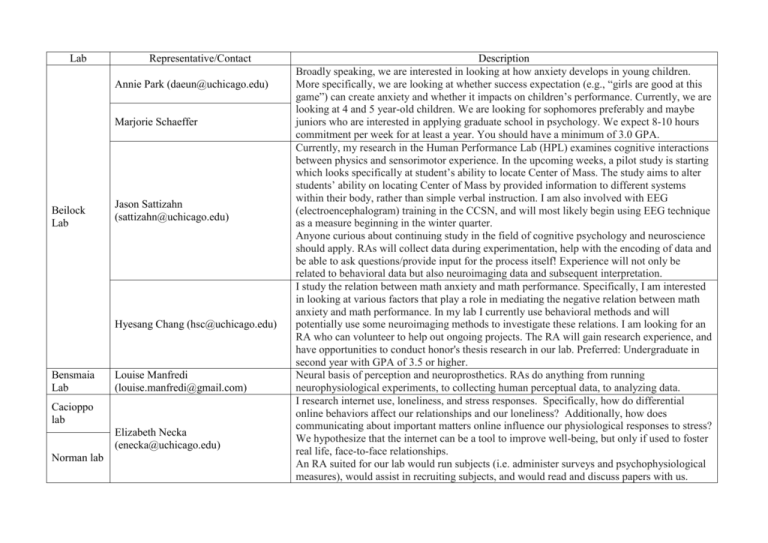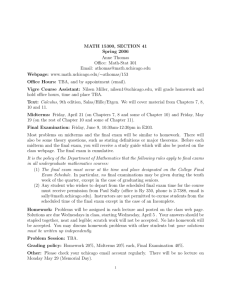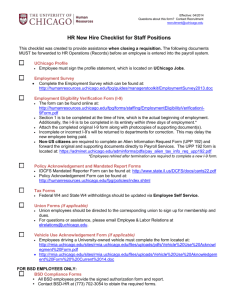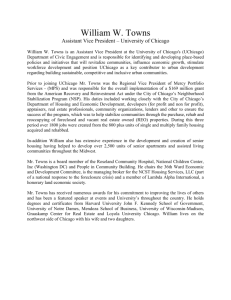here - Psi Chi at the University of Chicago
advertisement

Lab Representative/Contact Annie Park (daeun@uchicago.edu) Marjorie Schaeffer Beilock Lab Jason Sattizahn (sattizahn@uchicago.edu) Hyesang Chang (hsc@uchicago.edu) Bensmaia Lab Louise Manfredi (louise.manfredi@gmail.com) Cacioppo lab Elizabeth Necka (enecka@uchicago.edu) Norman lab Description Broadly speaking, we are interested in looking at how anxiety develops in young children. More specifically, we are looking at whether success expectation (e.g., “girls are good at this game”) can create anxiety and whether it impacts on children’s performance. Currently, we are looking at 4 and 5 year-old children. We are looking for sophomores preferably and maybe juniors who are interested in applying graduate school in psychology. We expect 8-10 hours commitment per week for at least a year. You should have a minimum of 3.0 GPA. Currently, my research in the Human Performance Lab (HPL) examines cognitive interactions between physics and sensorimotor experience. In the upcoming weeks, a pilot study is starting which looks specifically at student’s ability to locate Center of Mass. The study aims to alter students’ ability on locating Center of Mass by provided information to different systems within their body, rather than simple verbal instruction. I am also involved with EEG (electroencephalogram) training in the CCSN, and will most likely begin using EEG technique as a measure beginning in the winter quarter. Anyone curious about continuing study in the field of cognitive psychology and neuroscience should apply. RAs will collect data during experimentation, help with the encoding of data and be able to ask questions/provide input for the process itself! Experience will not only be related to behavioral data but also neuroimaging data and subsequent interpretation. I study the relation between math anxiety and math performance. Specifically, I am interested in looking at various factors that play a role in mediating the negative relation between math anxiety and math performance. In my lab I currently use behavioral methods and will potentially use some neuroimaging methods to investigate these relations. I am looking for an RA who can volunteer to help out ongoing projects. The RA will gain research experience, and have opportunities to conduct honor's thesis research in our lab. Preferred: Undergraduate in second year with GPA of 3.5 or higher. Neural basis of perception and neuroprosthetics. RAs do anything from running neurophysiological experiments, to collecting human perceptual data, to analyzing data. I research internet use, loneliness, and stress responses. Specifically, how do differential online behaviors affect our relationships and our loneliness? Additionally, how does communicating about important matters online influence our physiological responses to stress? We hypothesize that the internet can be a tool to improve well-being, but only if used to foster real life, face-to-face relationships. An RA suited for our lab would run subjects (i.e. administer surveys and psychophysiological measures), would assist in recruiting subjects, and would read and discuss papers with us. Ivo Gyurovski (iigyurovski@uchicago.edu) Cloutier lab Tianyi Li (tianyi@uchicago.edu) Carlos Cardenas-Iniguez (cardenas@uchicago.edu) Brooke Slawinski (bslawins@bsd.uchicago.edu) De Wit lab Jonathan Solamillo (jsolamillo@yoda.bsd.uchicago.edu) Decety lab Decision Research Lab Psychology of Belief & Judgment Lab Jason Cowell (cowell@uchicago.edu) Travis Carter (travis.carter@chicagobooth.edu) Andrea Dittmann (andrea.dittmann@chicagobooth.edu) Ivo Gyurovski works in the Cloutier Lab, which is involved in a multimodal approach (fMRI, EEG, EKG/EMG) to person perception research. Ivo uses a brain imaging approach to explore neural correlates of attention to different social statuses and how this perception is influenced by the subjective status of perceivers. Tianyi uses EKG and EMG to investigate other types of physiological responses (e.g., heart rate, facial muscle) to the perception of status. Carlos uses EEG to measure the electrophysiological response of status perception in different social contexts. The HBPL investigates the determinants and the consequences of drug and alcohol use by measuring physiological, behavioral and subjective effects of acute doses of psychoactive drugs in human volunteers. We are looking for several volunteers who will work with a graduate student or post-doctoral fellow, ideally on a specific project that they can read up on and get involved with, and will be supervised by Dr. de Wit. Tasks may include data entry, scoring video tapes, library research, or possibly subject monitoring and testing. We are also open to having undergrads identify a data analysis project of their own, for credit/honors theses. Background in psychology and some research experience is preferred. Must be familiar with Excel, have excellent interpersonal skills, and be able to follow detailed protocols and instructions. My research focuses on the development of morality and the neural correlates of moral reasoning and action in childhood and adolescence. Over this upcoming year, I am interested in highly motivated research assistants who want to have hands-on experience testing and interacting with children. Additionally, by next quarter, we will be in the process of collecting EEG data with children. The Decision Research Lab (DRL) is a shared lab devoted to the psychological study of how individuals form judgments and make decisions, broadly construed. Researchers examine the processes by which intuition, reasoning, goals, and social interaction produce attitudes, beliefs, judgments, and choices. We are looking to hire RAs with strong interpersonal skills who are organized, detail-oriented and professional, preferably with experience in a psychology or other social sciences lab. The Psychology of Belief and Judgment Lab (PBJ) is devoted to studying the underlying psychological processes that influence the beliefs people hold about the world and the judgments they make about themselves and others. We are looking to hire RAs who are conscientious, reliable, and hard-working with strong interpersonal skills and interest in judgment and decision-making research, preferably with previous research experience. Gallo Lab Jessica Wong (jtwong@uchicago.edu) GoldinMeadow Lab Kensy Cooperrider (kensy@uchicago.edu) Dr. Sydney Hans Renee Edwards (rcduffy@uchicago.edu) Kinzler Lab Jennifer Galamba (jmgalamba@uchicago.edu) I study memory and metacognition in older adults (age 65-90). I am looking for a volunteer RA who will assist with older adult recruitment, screening, testing, and data analysis. Our lab researches the gestures the people produce when they talk. It turns out that gestures not only provide insights into people's thought processes but also change those very thought processes, often in surprising ways. I am currently looking for a research assistant to help with a new project on the role of gesture in analogical thinking. We are looking for an RA who: (a) is excited about the lab's research and is very dependable; and (b) can commit to working 7-10 hours a week. Tasks will include: 1) developing and refining experiment materials; 2) running participants through experiment(s); 3) analyzing video data. This study is a randomized controlled trial of a home visiting program designed to promote positive health, parenting, and mental health outcomes for teenage mothers, and good health and developmental outcomes for their infants. Mothers participating in the study are interviewed twice during pregnancy and at 3 weeks, 3 months, and 13 months postpartum in their homes. They are asked questions regarding their parenting, health, mental health, relationships, and experiences with the doula program or case management services. Mothers are also videotaped interacting with their infants at each postpartum visit. Special Requirements: We are looking for a BA- or MA-level student who is organized, pays very careful attention to detail, is skilled at computer keyboarding, and preferably has some experience with computer data bases or spreadsheets. Nature of work: The research assistant will be part of a team of a dozen professional and student researchers led by Sydney Hans and Linda Henson. The research assistant will primarily be responsible for inputting interview responses into a Microsoft Access database, but may also be involved in reviewing interview protocols and assisting with general office tasks. Number of Hours: Up ten hours a week. Work hours can be flexible. Our research is broadly concerned with the development of social cognition. We place particular emphasis on the emergence of social group preferences and attitudes, often investigating children’s attention to language and accent as a marker of group membership. Members of the lab are also interested in varied topics including (though not limited to) essentialism, bilingualism, and social influences on children's reasoning about food. We are looking for students who are willing to make a minimum of a yearlong commitment (many of our students end up staying in the lab for longer, and eventually pursuing a senior thesis). Introduction to Developmental Psychology is a prerequisite; you may also take the course this Winter. Past research experience is desired, however we are also willing to work with first or second year students who are interested in getting involved in research for the first time. Dominic Gibson (dominic.gibson@gmail.com) Levine Lab Chris Young (youngcj@uchicago.edu) Mateo Lab Meghan Neaton (mneaton@uchicago.edu) Prendergast Lab Sean Bradley (spbradley@uchicago.edu) I study how children learn, particularly how they learn about numbers and basic math concepts. This includes everything from 2-year-olds' understanding of the number "two" to slightly older children's intuitions about angles and fractions. By studying where kids begin and how they learn I hope to improve educational interventions as well as gain a better understanding of how the mind works more generally. I'm looking for research assistants who are interested in all aspects of working in a developmental psychology lab - running experiments with children, creating stimuli, scheduling families to participate in our studies, and so on. We are conducting research on the relation between basic spatial abilities and skills and mathematical performance. We plan to investigate whether spatial training has an effect on math performance and by what mechanism. Presently we are conducting foundational research that will correlate performance on a variety of spatial measures (e.g. mental rotation) to understanding of mathematical concepts (e.g. flexible use of the equal sign) in elementary school children in the Chicago area. The eventual goal of this research is to determine what types of spatial training will be most effective in improving math abilities. We are looking to recruit several paid Research Assistants who meet the following criteria: 1. Experienced working with children and familiar with daily school timetable 2. Experienced/interested in learning how to administer psychometric tests 3. Have flexibility especially during school hours (at least 20 hrs per week) 4. Access to reliable means of transportation In general, the Mateo lab is interested in social behavior in a variety of animals (current species include ground squirrels, dolphins, chimpanzees, coyotes, gorillas, and humans). We examine social behavior from both physiological and evolutionary perspectives. We are also interested in the developmental mechanisms responsible for certain social behaviors. At this time, we are looking for one or more undergraduate assistants with experience in the following areas: genetic analysis (must have experience with PCR) hormone extraction (must be willing to travel to Lincoln Park Zoo) coding primate behavior Additionally, if an undergraduate is interested in working on an honors thesis, we do have some chimpanzee video that we would be willing to share! Biological rhythms in behavior, hormones, and the immune system, especially: a) Genetic basis of seasonal changes in behavior and physiology b) The influence of circadian rhythms on reproductive function and immune challenges c) The role of food in influencing circadian rhythms Rios Lab Alysson Light (ael@uchicago.edu) Freedman Lab David Freedman (dfreedman@uchicago.edu) Christian Hansel (chansel@bsd.uchicago.edu) Hansel Lab Sisodia Lab Sangram Sisodia (ssisodia@bsd.uchicago.edu) Vezina Lab Nancy Bubula (nbubula@bsd.uchicago.edu) I am looking for 3-4 research assistants to work as a team collecting data for two studies. They do not need previous research experience, but I will give preference to students who have already taken research methods. I am in social psychology, and my research relates to the selfconcept, motivation, and self-control. Labs that could not attend: How visual feature encoding in sensory brain areas is transformed into more abstract and experience-dependent representations that reflect the behavioral significance of stimuli. The cellular and molecular mechanisms underlying learning and memory The cellular and molecular biology of the b-amyloid precursor protein (APP), or presenilins (PS1 and PS2), molecules that are mutated in pedigrees with autosomal dominant, familial forms of Alzheimer's disease (FAD). How the neurotransmitters of the basal ganglia contribute to the generation of appetitive behaviors.






